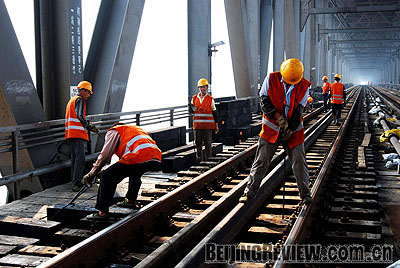|

The government's 4-trillion-yuan ($586 billion) stimulus package, equal to 15 percent of China's GDP, came as heartening news not just for the country itself, but the whole world in the midst of a darkening economic outlook.
Mu Hong, Vice Minister of the National Development and Reform Commission said at a press conference on November 14 that the Central Government would add an extra 100 billion ($14.6 billion) to its spending budget in the fourth quarter this year. Over the next two years, the Central Government will spend a total of 1.18 trillion yuan ($172.8 billion) and obtain additional funds from local governments and other sources to boost the overall economy. The burst of public spending is expected to spark a big multiplier effect throughout a number of sectors and pump up the country's growth, which dropped to 9 percent in the third quarter from 10.4 percent in the first half of this year.
Although it remains to be seen whether the stimulus package can put the economy back on its previously brisk pace, it is no doubt a welcomed cushion in case of further contraction. Moreover, the government spending spree is certain to help hold up domestic demand in several key sectors, while the tepid consumer market seems less likely to pick up some of the slack.
"Although there will be some lag before the actual spending and its multiplier effect work through the economy, the stimulus plan is set to rebuild rapidly weakening confidence and unleash domestic demand to counter the prospect of a global economic recession," Tan Yaling, an economist at the China International Economic Relations Association, told Beijing Review.
"Whatever doubts about the exact scale of the stimulus package, the government's determined response to the global economic downturn has delivered a boost to market sentiment," she said. "The country is in a healthy fiscal position and has adequate capacities to realize the goals of the stimulus package."
Zuo Xiaolei, Chief Economist at China Galaxy Securities Co. Ltd., told Beijing Review that the massive investments would spur the economy in the short term, while the stimulation efforts directed towards the countryside and social welfare would put a floor under the consumer market in the longer term. It appears that construction-related, agriculture and hi-tech industries would be the biggest direct beneficiaries of the spending program, she added.
Zhuang Jian, a senior economist at the Asian Development Bank, echoed Zuo's opinion.
| 